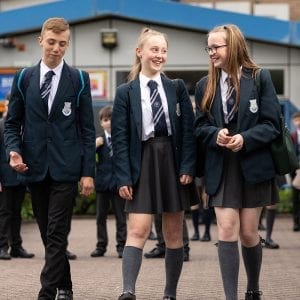Oracy by Sam Rigby-White
So here I am. I am the new Deputy Headteacher at Birchwood and I am so happy to be in my new role! I have spent half a term in my role so far which has been exhausting but fabulous. My responsibilities lie with the Quality of Education and CPD and I am excited about the next stage of the journey in this fantastic school.
During the first half term, I have been lucky enough to work alongside Ms Jones, focussing on the Knowledge Rich Curriculum (KRC). I am delighted that Birchwood is passionate about ensuring all students have access to a curriculum that is steeped in knowledge and ensures expectations remain high for all children, regardless of need or circumstance.
One of the key components of developing our KRC is vocabulary and as part of that, it is my intention to drive Oracy Education across the school, supported by the constant improvement drive around questioning. With this in mind, and the fact that oracy development was the focus of my NPQH project earlier this year, I wanted to write something for the school’s Teaching and Learning blog.
Oracy is a complex matter. As discussed by Gaunt and Stott (2019), Oracy is often both everywhere and nowhere in a school. It is not always easy to define and could be considered by many as impossible to measure.
We live in a world that has rapidly changed over the last 20 years. Our children are often addicted to screens and as such, oracy skills have suffered. I comment as a mother, observing my own children and as a teacher, observing others. Face to face conversations have often diminished. Phone calls have reduced, and the use of text messaging services have increased. This has resulted in less vocabulary exposure and confidence issues when faced with the unknown. I see many children struggling to express themselves and use language positively; both in relation to their learning and when articulating their own strengths and achievements.
Rosenshine’s principles of instruction (2012) remains extremely popular as a pedagogy that many schools have used as a “textbook” model to support progress in classrooms. I believe Rosenshine’s principle of “Questioning” can be a key driver for oracy development and want to consider some of the implications of this here.
Sherrington, (2019) discusses questioning exchanges and the importance to ask children what they have understood rather than the question, “Do you understand?” Of course, children who display an oracy deficit are far less likely to be able to engage in these aspects of classroom practice which is something that continually concerns me. Our research focus during half term one, considered learning behaviours. Although oracy is the focus next term, it all remarkably and unintentionally (but beautifully) linked as staff raised concerns over passive learning and students who are content to “opt out” when being asked questions.
Children opt out for many reasons. Some don’t know the answer, some are embarrassed to speak out loud and some are simply disengaged with subject content and perhaps “can’t be bothered.” But accepting this is doing a huge disservice to oracy development and ultimately student progress. Oracy and language development needs to be a priority.
Voice 21 (2019) identifies several benchmarks to measure oracy development and considers the impact of high-quality oracy education. The four strands they include are: physical, linguistic, cognitive, and social and emotional.
Focussing on embedding vocabulary is something we will be doing throughout the year and will be an aspect of our research and development group before Christmas, but I can’t help wondering about the social and emotional aspect of talk and the way we support students who have a particular deficit in this area.
Scaffolding is something else I intend to discuss at a later date in the school blog, but the fact is many children require appropriate scaffolds to develop oracy. Something that is perhaps thought about less than when we scaffold writing.
Scaffolding talk will be a priority for me moving forward. Vocabulary acquisition is key and is so important as an aspect of our knowledge rich curriculum and consistently high aspirations of all students, but many won’t just “get it.” We will need to teach oracy explicitly if we are to see sustainable improvements that allow children to progress and develop holistically.
In writing this, I have posed more questions for myself and have answered very little, but it has sharpened my determination to ensure I get this right for the children in our school. Evidence suggests that children with an oracy deficit and poor verbal communication skills are less likely to find sustainable employment and more likely to suffer from poor mental health in the future. I’m not prepared to take a chance on this. Oracy improvement is now firmly near the top of my “to do list.”





